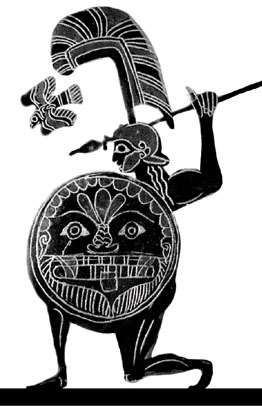 |
 >
Roman Life >
Roman Life
Roman Food
Italy – good natural conditions. Modified by seas, mountains, wind. Good soil. NE to SE.
Early Romans = Shepherds. Meat, wild fruits, nuts.
Pecunia = money (pecu = flock).
Fabius (faba = bean), Cicero (cicer = chickpea), Piso (pistor = miller), Caepio (caepe = onion)
Porcius (porcus = pig), Vitellius (vitellus = calf), Ovidius (ovis = sheep)
Garden = second meat supply. But meat not principal food => Grapes, olives, grain.
Apples, pears, plums, quinces. Competition for cultivation, naming new fruits.
Introduced Nuts – Almonds, filberts, hazelnuts, pistachios, walnuts.
Introduced Fruits – Apricots, peaches, pomegranates, cherries(Lucullus, from Cerasus in Pontus)
Lemons = 300 AD, Oranges not known. Dried/Preserved fruits – Slow tranport, no fresh fruit
Vegetables – Artichokes, asparagus, beans, beets, cabbage, carrots, chicory, cucumbers, garlic, lentils, melons, onions, peas, poppy seed, pumpkins, radishes, turnips.
Corn, potatoes, tomatoes – not known.
Beans (too heavy for people not doing hard labour), Onions (unrefined to eat)
Cabbage = Cato pronounced finest vegetable.
Imported larger / better vegetables – not fresh.
Greens – cress, lettuce, mallows. Poppies – poppy seed w/ honey, sprinkled on bread
Anise, cumin, fennel, mint, mustard. Pepper imported.
Beef – luxury food, ordinary citizens ate only on special occasions (such as sacrifice to gods)
Heart, liver, lungs = priest¡¯s share, some burned on altar.
Large size hard to store unless cold weather, so not common eat.
Used cows for draft / dairy purpose.
Pork – Choicest domestic meat. Many names => Sus, porcus, porca, aper.
Suovetaurilia = (sus + ovis + taurus) religious ceremony, pig comes first.
6 kinds of sausage from pork, 50 ways of cooking pork.
Mutton + veal. Goat¡¯s meat => lower classes.
Chickens, ducks, geese, pigeons. Turkeys not known till 1492.
Peacock - $10, rich food.
Cranes, grouse, snipe, woodcook – wild fowl, raised in preserves in large estates
Thrushes = small birds.
Boars + hare – wild animals bred for food. Boars served whole. Dormouse = delicacy.
Mullet (mullus), turbot (rhombus). Oysters.
Fresh fish = alive transport => fishponds in rich house, Lucius Licinius Crassus 92 BC
Salt fish, eggs, cheese – popular – Cicero says = hash.
Milk, cream, curds, whey, cheese. Sheep, goat, cow milk.
Ewe¡¯s milk cheese = more digestible, less palatable than cow¡¯s milk cheese.
Goat¡¯s milk cheese = less digestible, better liked
Butter = salve, not food
Honey = sugar (had no real sugar). Salt = evaporate sea water -> mine -> gov¡¯t monopoly.
Salt kept cheap.
Frumentum = food grain. 55 times in Gallic War. Corn translate Frumentum = grain
Usually wheat – staple grain for food.
Barley, oats, rye – Barley not used, oats feed cattle, rye not grown.
Far (spelt) = wheat, used much => not used. Only in cake for confarreate ceremony of marriage.
Puls = grain pounded by mortar, mixed w/ water, porridge. => Plautus – ¡°pulse eaters¡±
Mortar pound grain => Mills develop.
Pinsitores, pistors = men who ground grain, bakers also called pistors b/c ground grain also.
Found oven beside mills.
Mills - 3 parts:
Meta = lower millstone. Cone shaped on bed of masonry w/ raised rim (collects flour)
Upper part – beam mortised, ending in iron pin/pivot (hung/turned framework)
Distance between meta/catillus controlled by length of pin. Control fineness
Catillus = Upper millstone. 2 funnels. Upper funnel = hopper for grain, lower fit w/ meta.
Framework – Strong + massive, beams used for turning mill fit into narrow part of catillus
Power provided by mules/horses. Slaves also (punishment)
Smaller hand mills used by soldiers. Water powered mills under empire. (rarely mentioned)
Porridge => Bread – thin cakes of meal + water baked in front of fire.
Ovens, breads made w/ yeast. Mater familias make before => Professional bakers 175 BC
After bakeries, bread not make in house. (in country still make)
Under Trajan, bread distribute to unemployed daily (not grain once/month).
Bakers in guild => privileges + immunities.
Water, salt, yeast add to flour => kneaded in trough/simple machine. Brick ovens.
True oven: Build fire. Opening furnish draft. Chamber retain heat after fire rake out.
Charcoal fire. Rake out fire into ash pit, put loaves in, vent closed.
Receptacle for water – harden bread.
Fine wheat flour = best bread.
Coarse wheat flour:
panis plebeius (common), panis castrensis (army), panis sordidus (dark),
panis rusticus (country)
Prefer fine white bread but whole wheat bread more nutritious.
Loaves circular, flat – like coffee cakes. Lines through center divide into 4+ parts.
Some bakeries also make cakes + confections.
Olives – many uses, much cultivation in southern Europe. From Greece => Italy (best olives)
Valuable for oil – best oil from not fully ripe, most oil from ripe.
Use like butter/fats in cooking, relishes, dressings.
Olives eaten both fresh + preserved.
Sprinkled w/ salt, left for 5 days, Dried in sun. Kept sweet in boiled grape juice.
Half ripe picked w/ stems, put in best oil. Retain flavour for more than 1 year
Green olives pickled in brine or crushed and preserved w/ spices/vinegar (relish)
Another Relish – stoning, chop up pulp, season w/ vinegar, coriander seeds, cumin, fennel, mint, place in oil. Served w/ cheese.
Wine – make with grapes, common next to water + milk. Drank mixed w/ water.
More water than wine (8x as much water in some). Only dissipated drank pure wine
Not considered civilized
Cheap wines – few cents a quart. Others very expensive.
Mulsum = 4 parts wine to 1 part honey. Mulsa = water + honey ferment together.
Apple cider, mulberry + date wines, cordials. No tea/coffee.
|

